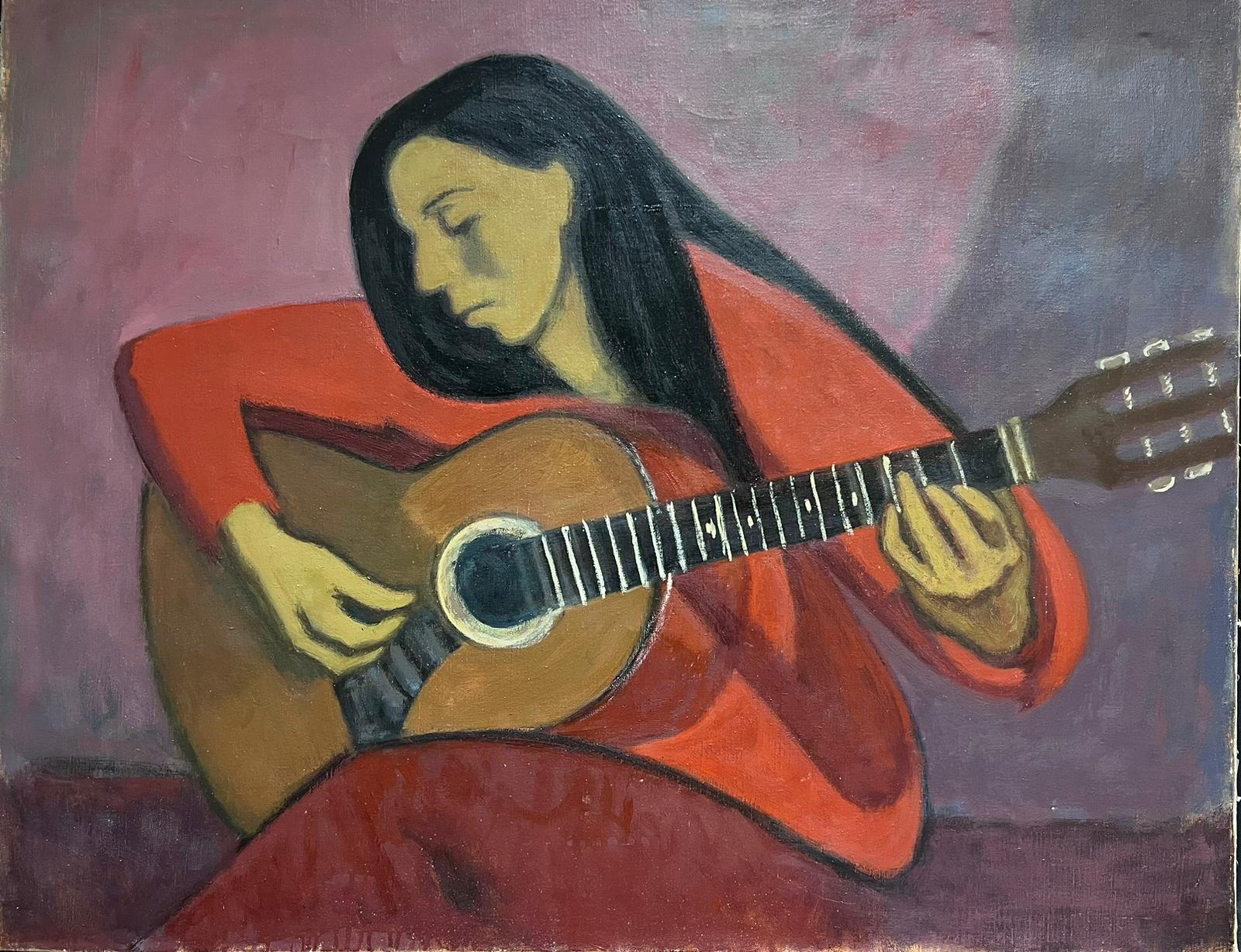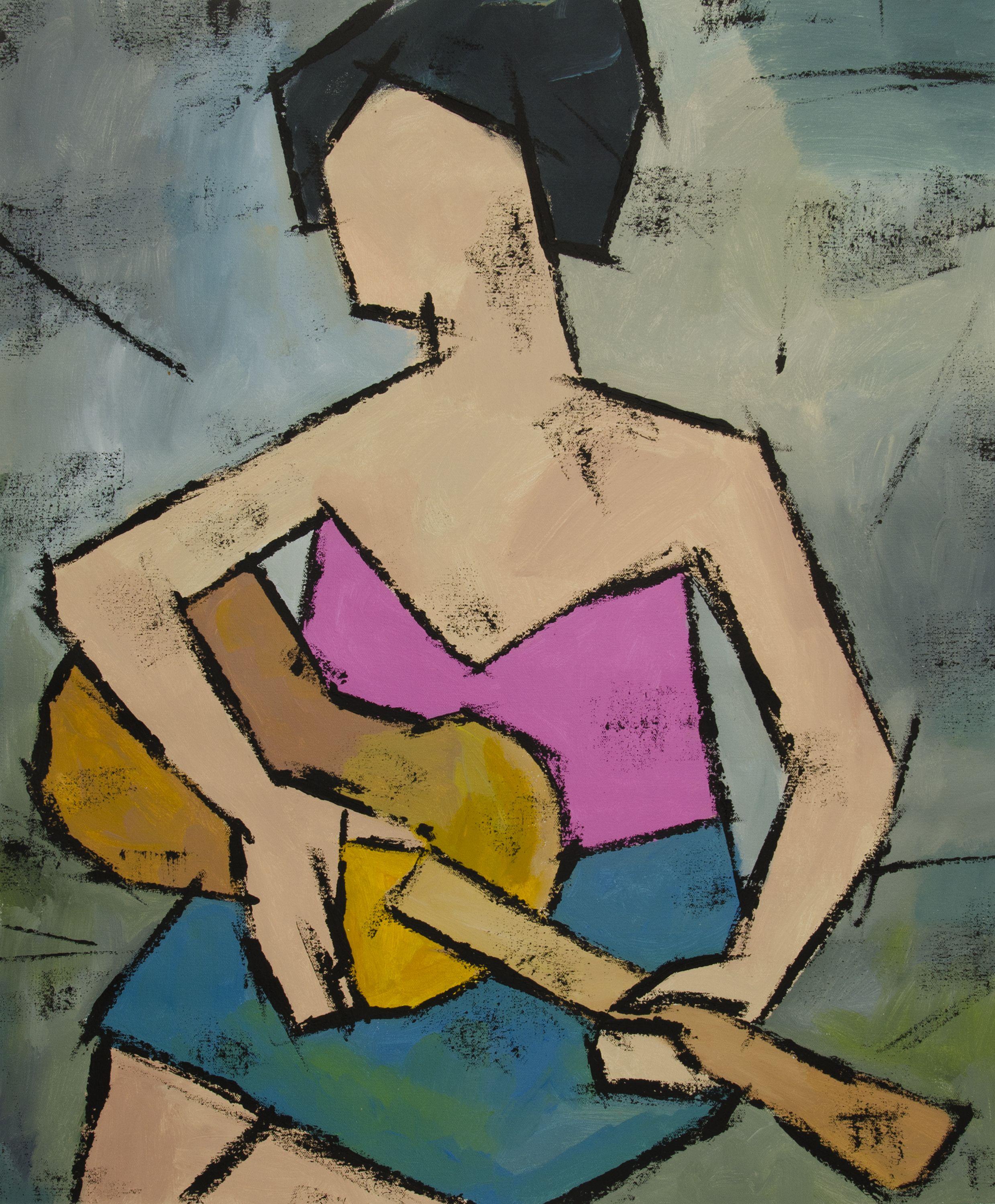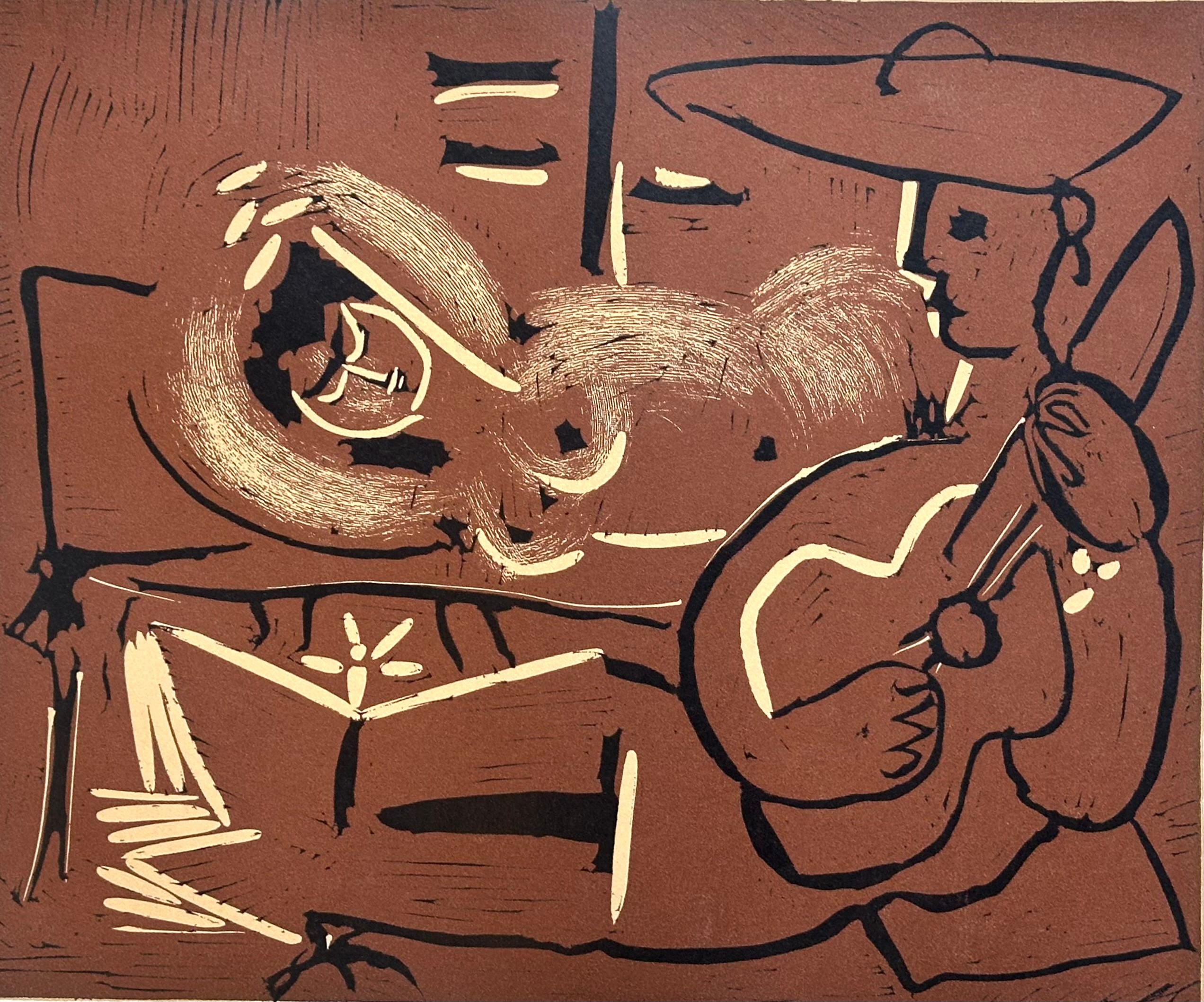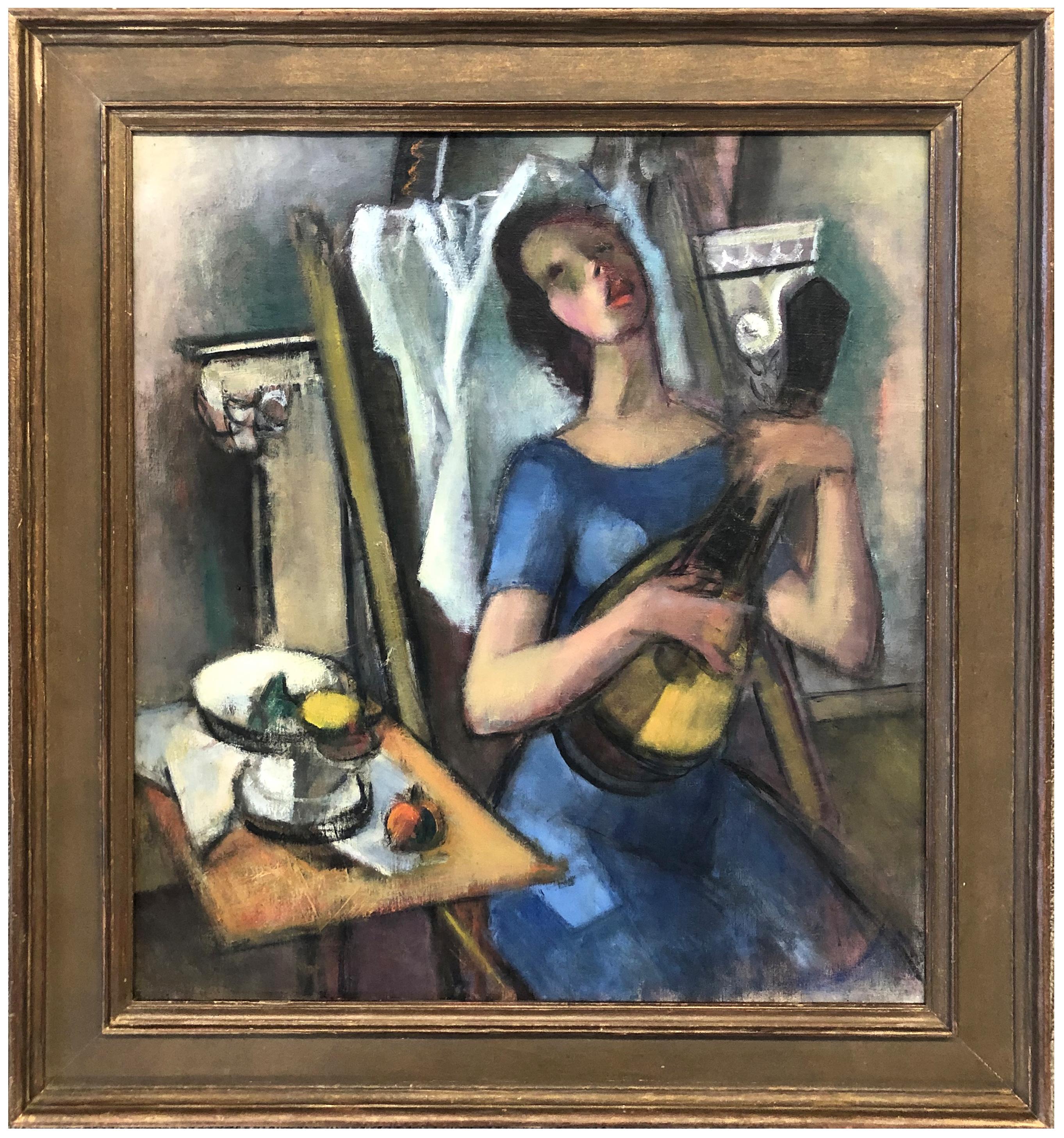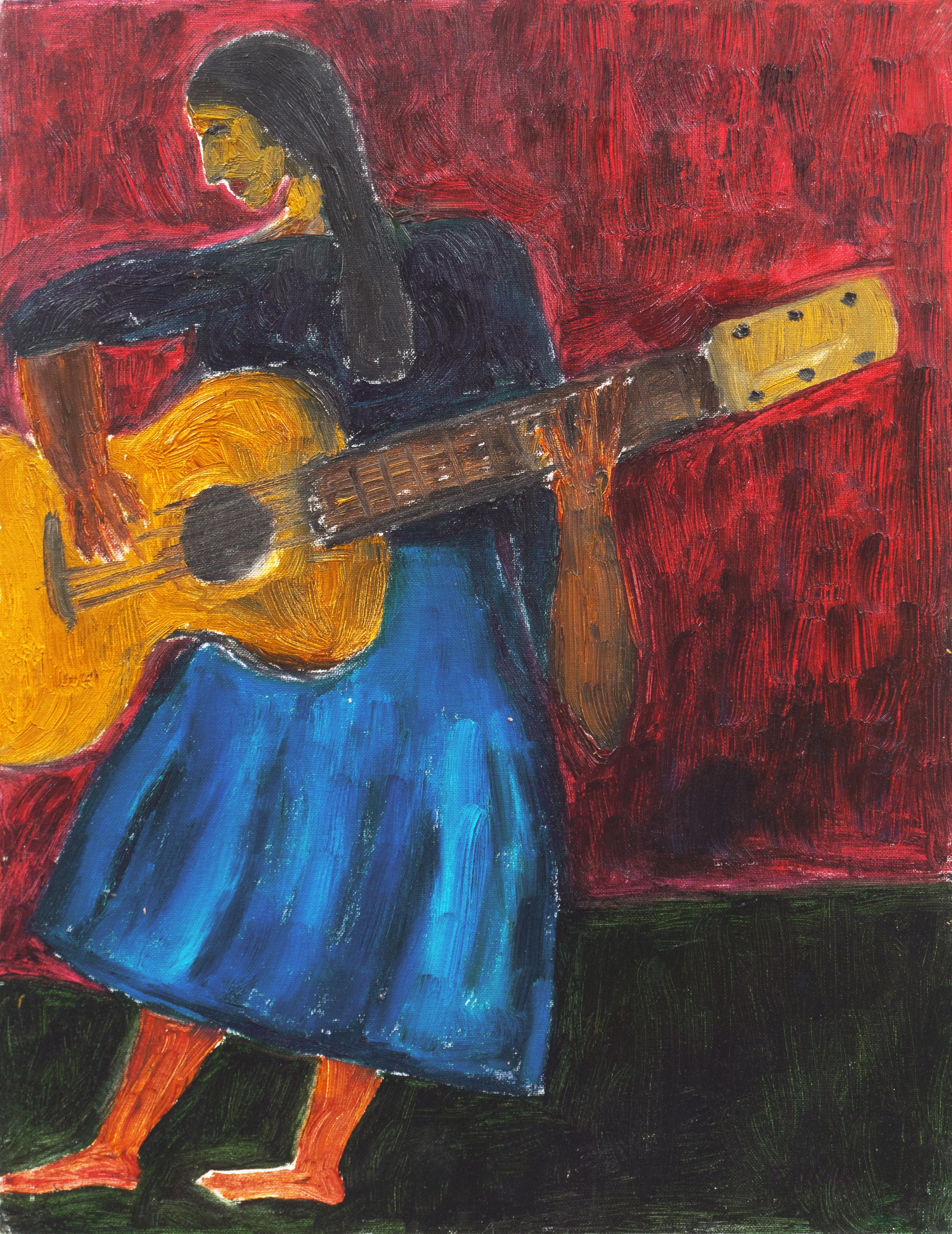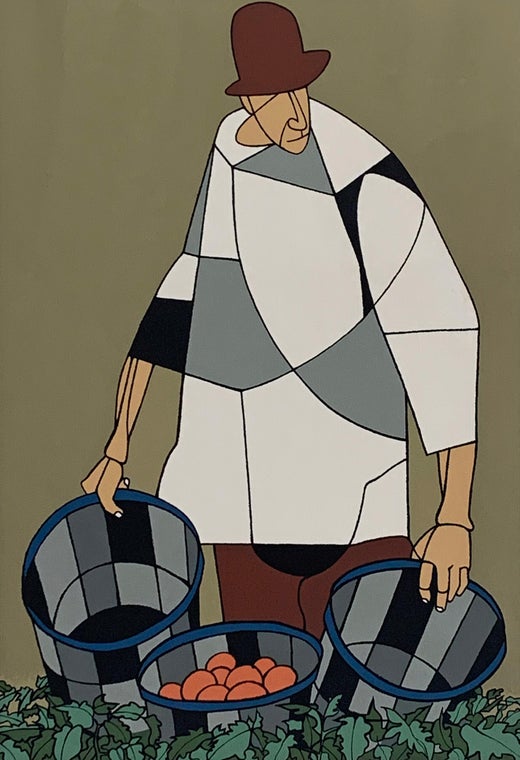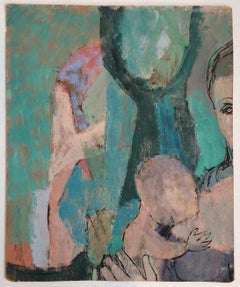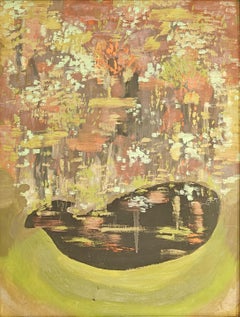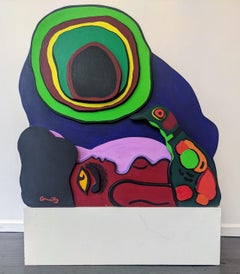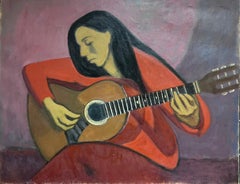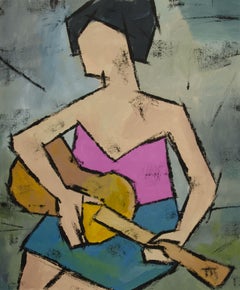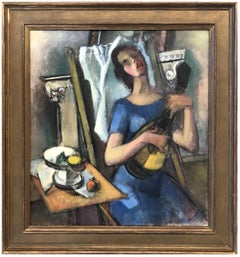Items Similar to "Girl with Guitar" Robert Gwathmey, Music, Southern Social Commentary, Modernism
Want more images or videos?
Request additional images or videos from the seller
1 of 14
Robert Gwathmey"Girl with Guitar" Robert Gwathmey, Music, Southern Social Commentary, Modernism1965
1965
$15,200
$19,00020% Off
£11,541.72
£14,427.1520% Off
€13,198.82
€16,498.5220% Off
CA$21,236.60
CA$26,545.7620% Off
A$23,619.74
A$29,524.6720% Off
CHF 12,333.49
CHF 15,416.8720% Off
MX$287,427.11
MX$359,283.8820% Off
NOK 157,517.54
NOK 196,896.9220% Off
SEK 147,723.66
SEK 184,654.5820% Off
DKK 98,507.84
DKK 123,134.8020% Off
Shipping
Retrieving quote...The 1stDibs Promise:
Authenticity Guarantee,
Money-Back Guarantee,
24-Hour Cancellation
About the Item
Robert Gwathmey
Girl with Guitar, 1965
Signed upper right
Oil on canvas
16 x 20 inches
Provenance:
The artist
ACA Galleries, New York
Mr. Moses Asch, New York
Terry Dintenfass Gallery, New York
Christie's East, November 14, 1991, Lot 440
Private Collection
Catherine Dail Fine Art, New York
Exhibited:
New York, Terry Dintenfass Gallery, Paintings and Silkscreen Prints, January 7 - 30, 1993.
New York, ACA Galleries, A Black Perspective, December 8, 2020 - May 1, 2021.
Richmond, Virginia Museum of Fine Arts, Storied Strings: The Guitar in American Art, October 8, 2022 - March 19, 2023, fig. 5.7, p. 102-4, illustrated; this exhibition traveled to Nashville, Tennessee, Frist Art Museum, May 26 - August 13, 2023.
Literature:
"Virginia Museum showcases guitar’s role in shaping America," Travel Courier, November 17, 2022, illustrated.
Steve Yarbrough, "The Sound of Wood and Steel," The American Scholar, May 25, 2023, illustrated.
W.A. Demers, "Storied Strings: The Guitar In American Art," Antiques and the Arts, November 8, 2022, illustrated.
Robert Gwathmey was a twentieth century artist who utilized his southern heritage as primary subject matter for his paintings. Although he lived most of his life in New York, he was born near Richmond, Virginia and traveled home frequently. An eighth-generation Virginian, Gwathmey was deeply impressed by his Southern heritage, something that is reflected by the imagery in his work.
Gwathmey's first formal artistic studies occurred in his twenties when he moved to Baltimore and enrolled at the Maryland Institute. "When I went to Baltimore to study art, the first thing I saw was Negro policemen and statues of Yankee generals. It was my first trip north, the farthest North I'd ever been, and I was 22 years old. When I got back home, I was shocked by the poverty. The most shocking thing was the Negroes, the oppressed segment. If I had never gone back home, perhaps, I would never have painted the Negro. I was shocked at the red clay, at the redness of the clay. The green pine trees and red clay were everywhere. The Negro seemed to be everywhere, too, omnipresent. But he was a thing apart, so segregated. When people ask me why I paint the Negro, I ask 'Don't artists have eyes'?"
Gwathmey advanced to studies at the Pennsylvania Academy of the Fine Arts where he won a Cresson scholarship that enabled him to travel to Europe during the summers of 1929 and 1930. There he saw the work of many artists covering a wide range of history; but apparently, he gravitated to the Gothic style above others.
Following his studies there, he taught at several schools in Pennsylvania before settling permanently in New York. Although New York became Gwathmey's favorite city in which to live and paint, he continued his established tradition of returning home to the South to visit family every year. In 1942, Gwathmey joined the faculty of the Cooper Union in New York, where he taught for 26 years.
In 1944-45, he received a Rosenwald Fellowship to live and work on a tobacco farm in North Carolina. Such an experience entrenched his work with rural southern themes and provided him with first-hand experiences to transfer to the canvas. The farmers particularly fascinated Gwathmey, their lean bodies with deliberate and stiff actions and often portrayed them as Christ-like figures.
Although the 1950s surge of Abstract Expressionism was definitely the reigning aesthetic of the time, Gwathmey took a stand against this movement, protesting against its rejection of representational art. He remained dedicated to the figural tradition, still relying on his subject matter to distinguish much of his art.
While Gwathmey was often labeled a "Social Realist," his imagery focusing on the lives of the African-American minority moves beyond pure social commentary on the plight of their situation within American society. Gwathmey remained true to his subject matter, but his exploration manifests a unique visual language. His work demonstrates a modernist tendency to abstract shapes, forms, and colors, all the while never abandoning the human figure. He incorporated such elements as large bands of color, low horizon lines, fragmentation of the human body, and completely flat picture planes into his paintings.
Gwathmey's distinctive style successfully fuses the formal elements of modern expression with a deeper, older tradition of realism. Despite the strength of Gwathmey's social and political commitments, perhaps his most effective work is less about advocacy for social change than an examination of the nature of community and the relationships between the races and sexes within his region.
Gwathmey's painting does not invoke social commentary per se, asking more for contemplation than pure action about the scene. Gwathmey's figures mimic the stained glass windows of the Gothic cathedrals he had seen almost two decades earlier with bright colors, bold patterning, and outlines in black. Pattern moves throughout his picture plane, typical of Gwathmey's ability to unite the figures into a tightly controlled, yet rhythmical composition.
Gwathmey himself stated, "I believe that in painting the use of limited imagery is the best method of presentation of your content. I believe that if the symbols are strong enough and simple enough and inventive enough, they can transcend literary [sic., literature?] in painting. One technical way of gaining this end is with simplified pattern. I'd also like to say that this is a modern way of painting…"
- Creator:Robert Gwathmey (1903 - 1988, American)
- Creation Year:1965
- Dimensions:Height: 17 in (43.18 cm)Width: 21 in (53.34 cm)
- Medium:
- Movement & Style:
- Period:
- Condition:
- Gallery Location:New York, NY
- Reference Number:1stDibs: LU1841213501302
Robert Gwathmey
Robert Gwathmey became an artist known for his Social Realist depictions of life in the rural South. He was one of the first white artists to create dignified images of African-American people and did so in a style that was Modernist with many geometric forms and bold coloration. Although he lived intermittently in Pennsylvania and in the South, he spent most of his 45-year career in New York City, where his studio was at 1 West 68th Street. Frequently, he returned to the South, where he became concerned about the problems dividing blacks and whites.
About the Seller
5.0
Platinum Seller
Premium sellers with a 4.7+ rating and 24-hour response times
Established in 2022
1stDibs seller since 2022
115 sales on 1stDibs
Typical response time: <1 hour
- ShippingRetrieving quote...Shipping from: New York, NY
- Return Policy
Authenticity Guarantee
In the unlikely event there’s an issue with an item’s authenticity, contact us within 1 year for a full refund. DetailsMoney-Back Guarantee
If your item is not as described, is damaged in transit, or does not arrive, contact us within 7 days for a full refund. Details24-Hour Cancellation
You have a 24-hour grace period in which to reconsider your purchase, with no questions asked.Vetted Professional Sellers
Our world-class sellers must adhere to strict standards for service and quality, maintaining the integrity of our listings.Price-Match Guarantee
If you find that a seller listed the same item for a lower price elsewhere, we’ll match it.Trusted Global Delivery
Our best-in-class carrier network provides specialized shipping options worldwide, including custom delivery.More From This Seller
View All“Woman with Rose” Lily Harmon, Female American Modernism Mid-century
By Lily Harmon
Located in New York, NY
Lily Harmon (1912 - 1998)
Woman with Rose
Ink and gouache on board
23 x 19 inches
Lily Harmon, was an artist who worked in portraiture, assemblage and book illustration, and whose ...
Category
Mid-20th Century American Modern Abstract Paintings
Materials
Ink, Gouache, Board
"Pond in Back of Her House" Virginia Berresford, Modernist, Abstract Landscape
By Virginia Berresford
Located in New York, NY
Virginia Berresford
Pond in Back of Her House
Signed and titled on the reverse
Oil on board
23 1/2 x 17 1/2 inches
Virginia Berresford was an underrated American modernist who had ...
Category
1950s American Modern Abstract Paintings
Materials
Oil, Board
"Tropical Parrot with Woman, " Corneille, Carved Wood Sculpture with Bird
By Corneille
Located in New York, NY
Guillaume Cornelis van Beverloo (Corneille)
Tropical Parrot with Woman, circa 1970
Signed: Corneille
Edition Number: 6 of 8
Constructed and Painted wood
39" high x 40 1/2" wide x 6" ...
Category
1970s Figurative Sculptures
Materials
Wood, Paint
"Nature morte" Bela de Kristo, Mid-century Cubist Still Life Abstract Cello
By Bela De Kristo
Located in New York, NY
Bela de Kristo
Nature morte, circa 1956
Signed lower right
Oil on board
19 5/8 x 11 3/4 inches
Provenance:
Alexander Kahan Fine Arts, New York
Private ...
Category
1950s Cubist Still-life Paintings
Materials
Oil, Board
"Woman Listening" Honore Sharrer, Magical Realism Landscape with Flora & Figure
By Honore Sharrer
Located in New York, NY
Honore Sharrer (1920 - 2009)
Woman Listening
Signed lower right
Caseine on paper
15 x 20 inches
Provenance:
Forum Gallery, New York
Private Collection
...
Category
Late 20th Century American Realist Landscape Paintings
Materials
Paper, Casein
$8,800 Sale Price
20% Off
"Untitled" Betty Parsons, 1977, Female Mid-century Abstract Expressionist
By Betty Parsons
Located in New York, NY
Betty Parsons
Untitled, 1977
Signed and dated lower right
Gouache on paper
5 1/2 x 3 3/4 inches
Renowned as an esteemed and legendary art dealer who for more than three decades was...
Category
1970s Abstract Abstract Drawings and Watercolors
Materials
Paper, Gouache
You May Also Like
Huge 1960's French Modernist Oil Painting Lady Seated Playing Guitar
Located in Cirencester, Gloucestershire
The Guitar Player
French Modernist artist, circa 1960's period
oil on canvas, unframed
canvas : 32 x 39.5 inches
provenance: private collection, France
condition: very good and sound...
Category
Mid-20th Century Modern Figurative Paintings
Materials
Oil
Woman with a Guitar, Painting, Oil on Canvas
By Tanya Grabkova
Located in Yardley, PA
This original oil and acrylic painting ΓÇ£Woman with a GuitarΓÇ¥ is painted by inspired Picasso. :: Painting :: Modern :: This piece comes with an official certificate of authentici...
Category
2010s Modern Paintings
Materials
Oil
Pablo Picasso Femme couchée et guitariste, 1962
By (after) Pablo Picasso
Located in Torino, IT
PABLO PICASSO, Malaga 1881 - Mougins 1973
Femme couchée et guitariste, 1962
Linoleoumography d'après in color. (mm270x325)
Perfect specimen published by the Cercle d'Art in 1962 unde...
Category
1960s Cubist Nude Prints
Materials
Linocut
Woman with a Guitar, Cubism
By Simka Simkhovitch
Located in Greenwich, CT
A period work by a Russian artist working in a Cubist approach. The canvas is 24 1/4 x 22 1/4 inches and the above dimension is the framed size. The frame is an older frame, with a flat gold/brown finish.
In Woman with Guitar, Simkhovitch plays on his his early fascination with Cubism and Constructivism (and his background in illustration) expressing and compressing with planes and color the spatiality of a domestic scene. Considered a master draftsman and an adherent of certain classicism, Simkhovitch’s compositions are often built up in a complicated but well-managed counterpoint, at heart, he is a romanticist preferring the dreamy colors of a Russian fairy tale.
Category
1940s Synthetic Cubist Figurative Paintings
Materials
Oil
Woman and guitar oil on board painting fauvism
By Jordi Curos
Located in Barcelona, Barcelona
Jordi Curós Ventura (1930-2007) - Woman - Oil on board.
Work measurements 46x38 cm.
Frame size 64x56 cm.
Jordi Curós Ventura (Olot, Girona, March 4, 1930) is a Spanish painter.
He ...
Category
1980s Fauvist Figurative Paintings
Materials
Oil, Board
'Woman Playing Guitar', California Post Impressionist oil, Santa Cruz, San Jose
By Jonathan Taylor
Located in Santa Cruz, CA
Painted circa 2000 by Jonathan Taylor (American, born 1968) and accompanied by a Certificate of Authenticity.
This listed California artist first studied art at the College of the Atlantic in Bal Harbor...
Category
1990s Modern Figurative Paintings
Materials
Oil, Board
